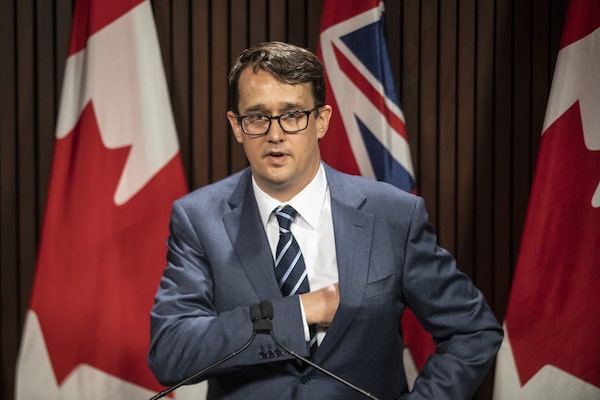
Ontario Labour Minister Monte McNaughton takes to the podium during a news conference in Toronto on Wednesday April 28, 2021.Chris Young/The Canadian Press
Ontario Labour Minister Monte McNaughton is considering giving full employee rights to Uber drivers and other so-called gig workers, sources say, a move that would escalate the government’s standoff with the world’s largest ride-hailing service.
No decision has been made. But two government sources familiar with the ministry’s decision-making process say Mr. McNaughton intends to bring forward more measures to help gig workers and that nothing is off the table. The sources said that including gig workers under the province’s Employment Standards Act is under discussion. The move would grant gig workers holiday and termination pay, among other employee protections that are denied to independent contractors.
The Globe and Mail is not identifying the sources, as they were not authorized to speak publicly.
The minister went ahead with legislation introduced this week to give what it calls “digital platform workers” a $15-an-hour minimum wage for their “active time” on deliveries or ferrying passengers, something Mr. McNaughton and Premier Doug Ford hailed as a first in Canada. The legislation also provides some other targeted protections, including requirements that app-based companies tell their workers more about how their software dispatches and evaluates them.
But the bill leaves open the question of whether these workers should be considered independent contractors or full-status employees. The two government sources said this stand-alone bill was easier to bring in quickly, rather than amending the Employment Standards Act.
Any move to give gig workers full employee status would face opposition from the Canadian arm of San Francisco-based Uber Technologies Inc., which has lobbied hard against the idea. The company argues its drivers benefit from the flexibility of app-based work, choosing when and how often they wish to ferry passengers somewhere or deliver takeout. In previous battles with governments, including in California and Quebec, Uber has threatened to leave if it did not get its way.
Even if Ontario does not make gig workers full employees, its courts could the make the decision instead. The fight for full employee status is the subject of a class-action lawsuit launched on behalf of Ontario Uber drivers. Courts and governments in several European countries have already made similar moves.
This week’s minimum-wage announcement is the latest in a series of pro-worker moves under Mr. McNaughton. Asked on Monday whether he would include gig workers in the Employment Standards Act, Mr. McNaughton said the newly introduced legislation was “not an end point” but did not offer further details.
To help gig workers and others without benefits, Mr. McNaughton has also set up an expert committee to design a “portable benefits” system for health or dental coverage. He declined to act on the recommendation of an expert panel last year that called for classifying gig workers as “dependent contractors,” giving them some limited protections. Some advocates for gig workers warned this would create a second-class category of employee.
In an e-mailed statement, Uber Canada Inc. spokeswoman Keerthana Rang noted that the company has called for the government to mandate an even higher minimum wage of $18 an hour for active time, meant to compensate gig workers for their downtime and fuel costs. Uber has also called for a portable benefits system for gig workers. And Uber recently signed a deal with the Canadian arm of the United Food and Commercial Workers, one of the country’s largest private sector unions, allowing it to act for its drivers.
But the company still wants the government to ensure its workers will not be considered full employees under Ontario laws. Ms. Rang said Uber supports the task force recommendation to create a separate “dependent contractor” category.
“This would protect the flexibility that drivers and delivery people need while bringing in benefits and protections,” Ms. Rang said.
Ontario’s Opposition NDP and some advocates for gig workers were quick to criticize Mr. McNaughton’s minimum-wage move. They point out that the $15-an-hour minimum wage only applies when gig workers are actually driving a passenger somewhere or delivering a takeout order. It leaves workers unpaid when they are on the app waiting to be dispatched.
Jennifer Scott, president of Gig Workers United – a “community union” affiliated with the Canadian Union of Postal Workers – said a minimum wage that only applies to active or engaged time is “absurd” and results in many gig workers continuing to make much less than minimum wage.
“Think about it in a context of a different workplace,” she said. “Engaged time for a cashier in a grocery store or wherever, would mean that ... they’re only paid when they are cashing somebody out.”
Gig Workers United also released a recent ruling this week by one of the Ontario Labour Ministry’s own employment standards officers, who concluded that an Uber Eats driver is an employee and deserves minimum wage, overtime pay and other protections. Uber has said it is appealing the ruling, which only applies to the driver in question, to the Ontario Labour Relations Board.
The government has said it intends to campaign in the coming June election on its recent legislative changes for workers. In a speech to the Canadian Club in Toronto on Thursday, Mr. McNaughton, a Progressive Conservative, said “modern conservatism has to be about helping working people.”
“As more parties of the left migrate towards the boutique social issues of the elite, they abandon hard-working people who deserve better,” Mr. McNaughton said.
 Jeff Gray
Jeff Gray